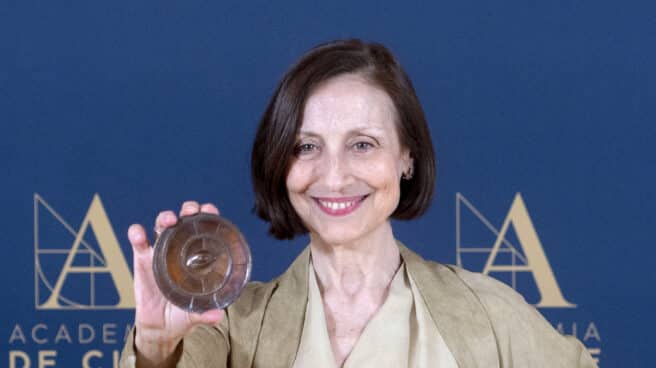

Theater and film actress Carme Elias y Boada receives a gold medal at the 2023 Academy Film Academy.
Actress Carmen Elias received this Thursday the Gold Medal 2023 from the Film Academy in an act of respect full of love and admiration her professional colleagues and that she got a taste of goodbye to the cinema of the Catalan translator who revealed just over a year ago that she was suffering from Alzheimer’s disease.
Actress and Vice President of the Film Academy Susi Sanchez assured that the medal is proof that Elias is “at the heart” of Spanish cinema and emphasized “his presence, charm and sensitivity” embody very different women.
Among those present at the presentation of the medal in recognition over fifty years of experience there were directors such as Gonzalo Suarez, Carlos Vermuth, who put it in who will sing to you (2018) or Javier Fesser, in Path (2008).
Also actresses such as Marisa Paredes, with whom he worked in The flower of my secret (1995) Pedro Almodóvar, Julieta Serrano, Roberto Enriquez or Carlos Hipólito, writers Elvira Lindo and Antonio Muñoz Molina or theater director Mario Gas.
Some of them read excerpts from his recently published memoir Cuando no sea yo, in which Elias speaks openly about its association with Alzheimer’s diseaseor her “friend Al”, as she cheerfully calls him and greets her colleagues as “an example of brilliant resilience and acceptance”.
Elias read with ease and excitement a speech he had prepared, in which he recalled how his vocation as an actress began, from a girl who, as a child, climbed into a chair to read poetry at Christmas, to the first amateur theater, and then professional.
He quoted Tagore’s famous poem. “If you cry because you can’t see the sun, your tears will prevent you from seeing the stars.” and admitted that the sun began to “cruelly” disappear from his life, but he also celebrated the past, laughed, cried, loved, suffered and enjoyed.
I think I’ve learned some life lessons and I hope to continue being active with the support of my family,” she said, despite admitting she is now “going backwards unlearned because of the love my friend Al has for my cells.”
Marisa Paredes He recalled the time they met, the 80s, “that one from La Movida” and one of the most exciting scenes they shot together in Almodovar’s film: “I will never forget that scene, that treacherous friend (Elias), in which he confessed as the bad behavior he led is one of the most touching things one can feel.”
Javier Fesser and actor Mariano Venancio talk about their experiences on set Pathfor which Elias won the Goya playing “that mother who goes from love to horror”. And Elvira Lindo spoke on behalf of the public that has followed her for many years and considers her “an integral part of our culture and our memory.”
The speech of director Claudia Pinto, with whom she is making a documentary about her career and the impact of the disease, was also emotional: “We are not an actress or a director, but two people without the armor of fiction, trying to capture the devil knows what.”
Juan Carlos Corazza, her teacher and the teacher of many great Spanish actors and actresses, mentioned her conversation with Elias, in which she herself assured that this act would be “farewell to cinema” and to many people.
Mario Gas has reviewed some of his most important theater work, where he has appeared in productions such as The Cat on the Zinc Roof, Man of Destiny, Almost a Goddess, Purgatory and Què va passar amb Bette Davis and Joan Crawford?” and many others.
Those who were unable to attend in person left their messages on the video: actors such as Aitana Sánchez-Gijón, Silvia Abascal, Vicky Peña and Luis Homar, director Isabel Coixet and theater directors such as Carme Portaceli or Josep Maria Flotats.
Elias (Barcelona, 1951) made his film debut with Orgy (1978) by Francesc Belmunta, followed by Stico, Too Young to Die Old, The Dazed King, Warsaw Bridge. , “The Worst Years of Our Lives”, “The Flower of My Secret”, “A Rich Man’s Nightmare”, “To Die (or Not)”, “The Year of the Flood”, “Difficult Airs”, “Plans for Tomorrow”, “Camino” and ” Who will sing to you.”
His last three films are signed by Venezuelan director Claudia Pinto: The Greatest Distance, Aftermath, and the documentary Here, Now.
Source: El Independiente